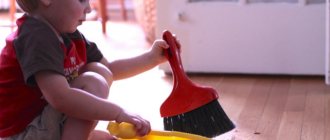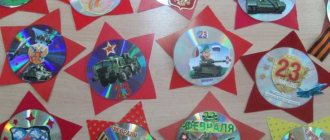Labor education in the senior group
Tatiana Oskina
Labor education in the senior group
Prospective planning of work activity in the senior group
2018-2019
Prospective planning of work activity in the senior group “City of Masters”
month
Labor activity
Date
September
1.Work in a corner of nature: watering indoor plants.
Task: consolidate knowledge about the need for daily watering of flowers.
2. Labor in nature : cleaning a group site .
Task: to continue to educate children to want to participate in joint activities.
3.Work in a corner of nature: caring for indoor plants
Task: we consolidate knowledge about indoor plants and the features of caring for them.
4. Game - competition “The best canteen attendant”
Task: independently, without an adult’s reminder, perform the duties of an attendant; plan your activities in pairs.
5.Work in the book corner: glue up the torn books.
Task: to continue to cultivate a caring attitude towards books.
October
1. Duty in a corner of nature.
Task: we strengthen children’s ability to pay attention to the sequence of actions when caring for plants.
2. Canteen duty.
Objective: strengthen the ability to independently and conscientiously perform duties.
3. Role-playing game “Kindergarten”
Task: to cultivate cognitive interest in the work of adults .
4. Labor assignment : we bring order to the group site .
Task: we continue to instill in children the desire for order.
5.Self-service: exercise “Let’s help Pinocchio get dressed”
.
Objective: strengthen children’s ability to dress and undress independently.
november
1. Household work : Game - competition “Keep everything clean”
Task: to consolidate the ability to notice disorder and eliminate it; continue to teach how to use the cabinet compartments for their intended purpose; cultivate a caring attitude towards things, a habit of order.
2. Household work : washing toys.
Task: we form children’s knowledge about the purpose of this work, strengthen the ability to outline a work plan.
3. Labor in nature : preparing shrubs for winter .
Task: to consolidate knowledge about the need to raking leaves to the root of the bush.
4.Self-care: “Locker room”
.
Task: Invite children to hold the next stage of the competition for the neatest cabinet.
5. Household work : we wipe down the shelves of the cabinets.
Objective: We continue to strengthen the ability to do work independently.
December
1. Labor assignment : clearing paths to the feeding trough, insulating tree trunks with snow.
Task: invite children to figure out how to complete two tasks at the same time.
2. Labor in nature : removing snow from buildings
Task: invite the children to look around and tell where snow is needed.
3. Household work : we bathe dolls.
Task: invite children to include this labor operation in one of the s/r games.
4. Household work : washing doll clothes.
Objective: to expand the experience of labor actions .
5. Canteen duty.
Task: consolidate knowledge on table setting.
January
1. Duty in a corner of nature: exercise “Flower Island”
.
Task: we consolidate the ability to observe plants and follow the rules of caring for them.
2.Self-care: exercise “Shoe rack”
.
Objective: to deepen children’s understanding of the rules of shoe care.
3. Household work : cleaning in the music education .
Task: we strengthen children’s ability to carry out work assignments that extend over time.
4. Labor in nature : setting up a feeder for wintering birds.
Task: invite the children to tell them what they know about hanging feeders and find a suitable place for it.
5. Labor assignment : feeding birds on the site.
Objective: consolidate knowledge about choosing food according to the birds.
February
1. Canteen duty.
Objective: increasing the independence of children at each stage of duty.
2.Self-service: game situation “Locker room”
.
Objective: to consolidate the ability to dress independently in a certain order.
3. Labor in nature : we will free shrubs and young trees .
Task: strengthen children’s ability to carefully free branches from snow.
4. Duty in a corner of nature: loosening the soil of indoor plants.
Objective: to expand the understanding of labor actions in caring for plants.
5. Household work : we wipe the chairs.
Task: we continue to form a conscious attitude towards order and act together.
March
1.Self-service: type of activity “I do it myself”
.
Objective: to improve children's self-care skills: drying clothes, cleaning shoes.
2. Duty in a corner of nature.
Objective: to generalize and supplement knowledge about the conditions necessary for plant life.
3.Work in a corner of nature: experience “Water Purification”
.
Task: consolidate children's knowledge about various methods of water purification.
4. Labor in nature : clearing paths to the group site .
Objective: to improve labor skills in working with various equipment.
5.Self-care: exercise “I do everything myself”
.
Task: we continue to form healthy habits.
April
1. Labor in nature : Collecting broken branches on the site.
Task: to create a desire to work together .
2. Labor in nature.
Task: we consolidate children’s knowledge of choosing work assignments based on their interests.
3. Household work : gluing boxes.
Objective: to improve the ability to perform relevant labor operations .
4. Labor in nature : cleaning the site.
Task: we continue to form a responsible, owner-like attitude towards our site.
5. Duty in a corner of nature: game situation “Flower Island”
.
Objective: to continue to improve children's plant care skills.
May
1. Work in nature : Spraying indoor plants with water from a spray bottle.
Task: to reinforce children’s understanding that leaves also need moisture; cultivate a caring attitude towards plants.
2. Canteen duty.
Task: strengthen the ability to set the table independently.
3. Household work : cleaning the group room .
Objective: strengthen the ability to negotiate the distribution of responsibilities.
4. Labor assignments : weeding a flower bed on the site.
Task: we continue to develop labor skills , teach them how to prepare a flower bed for planting.
5.Work in the book corner: repairing books.
Task: to help children divide into working groups based on interests .
A few words about labor education
“You can’t even pull a fish out of a pond without effort” is taught in kindergarten. Not because this proverb is part of folklore, but because it really is so. Labor activity underlies a person’s entire life, from the moment of birth to the last breath. Giving a child knowledge and not teaching him how to work is the same as giving a car and not teaching him to drive. But we want the best for our children, right? Do we want our children to confidently manage their lives, cope with difficulties and solve complex problems? Then we place labor education in the “red corner”.
How do we understand education through labor? What is this? Pedagogy defines this process as the involvement of children in various work activities, organized and systematic. By engaging in work that is useful to society, children learn the experience of production work, labor skills and abilities. In addition, they develop creative thinking, hard work and patience.
Goals of labor education
?
Education through labor is an indispensable condition for the comprehensive, full development of the individual. On the one hand, physical labor stimulates mental activity, and on the other, the moral qualities of the individual.
In pedagogy, the main goal of labor education is the moral and psychological (practical) preparation of children for work. The goal is achieved gradually, taking into account the age, capabilities, and interest of the children. The global goal is a hardworking society, ready for change, capable of working for the benefit of their families and the common cause.
Labor education at school - the main tasks and their solution
Labor education begins in the family - we have talked about this more than once. But school also has a significant influence on the upbringing of a young person. For schoolchildren, work is a necessary and important means of developing moral ideas and personality traits. The goal of labor education of schoolchildren is the formation of a natural physiological and intellectual need for work. At school, it is closely connected with the polytechnic training of students, which ensures a level of knowledge of the basics of technology and organization of production.
Within the walls of a comprehensive school, labor education solves several basic and important tasks:
- Motivation to work, stimulation of interest in knowledge, the need for work as a creative process, the desire for practical activity;
- Formation of a positive attitude towards work among schoolchildren;
- Education of moral qualities: a sense of duty, hard work, responsibility, mutual assistance, determination, perseverance, honesty;
- Development of students' creative abilities through manual labor;
- Schoolchildren mastering various types of techniques, labor skills, forming an internal culture of physical and mental work.
Tasks of labor education of preschool children
Labor education of preschool children begins in the family and is of great importance for the development of a little person. Preschool age is a period of imitation. Children copy everything they see. They like to work. This unique moment cannot be missed. It is necessary to encourage initiative, stimulate interest, and develop the work skills of children.
According to the Federal State Educational Standard, the term “labor education” is a system for developing in children diligence, labor skills and the desire to learn to work.
Teachers see the goal of labor education in kindergarten as the formation of the same positive attitude towards work and moral qualities. Instilling respect for the work of adults is one of its main goals.
In the work activities of preschoolers, an important role is assigned to the teacher. The teacher’s task is to help the child acquire his own experience and skills in work that is feasible for his age. Involvement in work activity allows them to demonstrate their abilities, feel like a part of the adult world, and enjoy the joy of contemplating the result of their work. The teacher organizes work activities, unites the team, teaches children to work together, help adults, and each other.
Goals and objectives of labor education of preschool children
Main tasks of labor education
In the process of labor, not only material objects are created, but also the person himself is improved. Therefore, the goal of labor education, first of all, is to educate a harmonious personality, and then to form his psychological and physical readiness for work.
Against the backdrop of social and economic development, reality places high demands when it comes to the identity of the producer. The importance of his attitude to work as a conscious need, as well as a vital need, a positive attitude towards work, respect for work (in general), and for its result is emphasized. Sociability, initiative, creativity – these are the qualities that the working world expects from a mature personality. And these qualities are formed in the process of labor education.
Readiness for work is the result of labor educational activities, which, in turn, solves the following problems:
- Formation of skills and abilities in work;
- Awareness of the goals and objectives of work;
- Formation of automotivation for work.
Labor education of children in the family
Considering that the economic, environmental and social situations in the country are changing dramatically, the direction and meaning of labor education is changing. New techniques, motivations and approaches are required.




